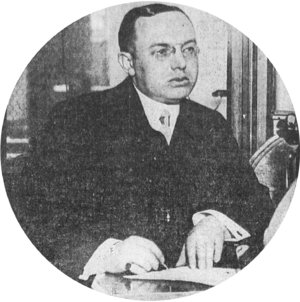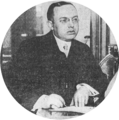Armgaard Karl Graves facts for kids
Quick facts for kids Armgaard Karl Graves |
|
|---|---|
| Max Meincke | |

Graves in a picture published in the Evening Public Ledger 4 February 1916
|
|
| Allegiance | |
| Service | |
|
|
|
| Born | 7 May 1882 Berlin, German Empire |
| Died | Unknown Unknown |
Armgaard Karl Graves was born on May 7, 1882, in Berlin, Germany. He was a secret agent, also known as a mole, who worked for both the British and German intelligence services. He spied for MI5, the British counter-intelligence agency, and also for the intelligence part of the Imperial German Navy. He was active both before and during First World War.
Contents
Early Life and Spy Work
Armgaard Karl Graves left the German Empire in 1898. He later returned to Germany around 1911. He used the name "A.K. Graves Dr Med."
Becoming a Spy
During the Agadir Crisis in 1911, Graves was recruited to work for the German intelligence service. This crisis was a time of high tension between European powers. His job was to watch the movements of Royal Navy warships. He focused on areas off Scotland, especially near the naval bases of Rosyth and Cromarty. For this work, he was paid £15 a month.
In early 1912, Graves traveled to Edinburgh and then to Glasgow. British police soon found out about him. They started watching his activities closely. He was arrested by Scottish police on April 14, 1912.
Working for the British
After his arrest, Graves was released from prison. He agreed to work for British Intelligence (MI5). He was paid £2 a month for this new role.
Graves then traveled to Berlin. His mission was to get a list of German spies in Britain for MI5. However, the German command sent him to the United States instead.
Life in the United States
In 1913, Graves asked MI5 for money to return to the UK. They did not send him any funds. So, Graves began to tell his story to the US newspapers. He presented himself as a "spymaster" and shared information about his work for both countries.
Just before the First World War began, Graves published his autobiography. It was called The Secrets of the German War Office. This book became very popular, selling 100,000 copies.
In 1915, he published a second book, The Secrets of the Hohenzollerns. He also wrote newspaper columns. In these columns, he shared his predictions about the First World War.
Later Years
In November 1916, Graves tried to get money from the wife of Johann Heinrich von Bernstorff. Bernstorff was the German Ambassador to the United States. Graves was arrested for this attempt.
In 1917, Graves was arrested again. This time, it was for being in a special zone for foreigners in Kansas City. He was held until the end of the war in November 1918. After the war, he stayed in the USA.
In 1934, he was sentenced to three years in prison. After he was released in 1937, he was supposed to be sent back to Germany. However, Graves said that Nazi Germany would harm him. Because of this, a government agency reportedly helped him stay in the US. Armgaard Karl Graves likely died in the USA.
Confusion with Robert Graves
There was a famous British war poet named Robert von Ranke Graves. At first, some people thought he might be a spy. This happened because a well-known German spy caught in England in 1911 used the name Armgaard Karl Graves. This spy had the same last name as the poet, which caused confusion.
See also
Images for kids


